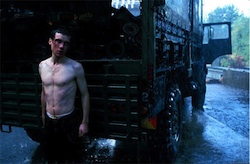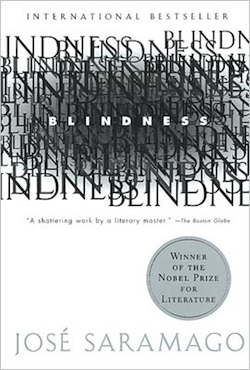Welcome to Genre in the Mainstream! This regular blog series highlights mainstream authors who employ genre elements in books that are generally classified as literary fiction. While we’re not claiming these writers for the science fiction and fantasy camps, we think if you like those genres you’ll probably like these writers and books, too.
This week, we enter a world in which no one has proper names, punctuation marks are rare, and every single character but one loses their sight in José Saramago’s novel Blindness.
As a disclaimer, I’d like to start by saying that I didn’t read Saramago’s 2004 sequel to this novel (Seeing), nor did I see the 2008 film version of Blindness. The book had such a profound effect on me that I really didn’t want my memories of the novel sullied by any other influence. And though I’ve heard from some quarters that the film is decent, I feel like the point of Blindness is that the action has to be imagined, thus allowing the reader to attempt to empathize with the characters afflicted with sightlessness.
Blindness presents a fairly straightforward science-fiction seeming premise: a mysterious epidemic of blindness sweeps an unnamed city, resulting in the first victims being quarantined by the government in an abandoned hospital. None of Saramago’s characters have proper names and are instead given titles. “The Doctor” or “The Doctor’s Wife” or “The Man With The Black Eye Patch” or “The Girl with the Dark Glasses.”
By naming some characters only by their physical appearance Saramago plays with the irony that no one, save for the Doctor’s Wife can actually see. This manages to make the reader somewhat uncomfortable by reminding us how much the sighted favor visuals in order to understand and perceive reality. But the disorientation is augmented not just by the action of the novel, but also by the fabric of the way the prose operates. As with many of his books, Saramago forgoes the use of quotation marks, making the dialogue enter into sentences almost violently. This simulates the kind of real conversations that would likely occur in a disaster scenario, with seemingly everyone talking at the same time with voices filled with panic. For Saramago, less is more, and a lot of the panic is perceived simply because the characters lack concrete identities and the dialogue seems to be out of even the author’s control.
 Like in Danny Boyle’s 28 Days Later, Saramago eventually reveals the true villain of the book is not the mysterious affliction, but rather human beings themselves. Yes, it is heavy-handed, but this is a fairly heavy and serious novel that doesn’t shy away from just how dark it is. In 28 Days Later when Jim starts killing the various soldiers at the compound, the movie goes out of its way to show us that he has taken on the qualities of the zombies. Blindness toys with this theme in a similar way when the core group of “good guys” makes their way out of the quarantine and into the world again. Here, they find that the epidemic has spread all throughout the city and a particularly horrifying scene takes place in a ransacked-supermarket where other members of society are depicted with almost zombie-like qualities. The basic question asked by the novel at this point is simple: how long would it take before a regular person would be okay with robbing a supermarket or killing someone else for food? And the conceit of Blindness is that it doesn’t take a zombie epidemic or space aliens or an asteroid impact to cause a major paradigm shift in society. Just the loss of one of the five senses from everyone.
Like in Danny Boyle’s 28 Days Later, Saramago eventually reveals the true villain of the book is not the mysterious affliction, but rather human beings themselves. Yes, it is heavy-handed, but this is a fairly heavy and serious novel that doesn’t shy away from just how dark it is. In 28 Days Later when Jim starts killing the various soldiers at the compound, the movie goes out of its way to show us that he has taken on the qualities of the zombies. Blindness toys with this theme in a similar way when the core group of “good guys” makes their way out of the quarantine and into the world again. Here, they find that the epidemic has spread all throughout the city and a particularly horrifying scene takes place in a ransacked-supermarket where other members of society are depicted with almost zombie-like qualities. The basic question asked by the novel at this point is simple: how long would it take before a regular person would be okay with robbing a supermarket or killing someone else for food? And the conceit of Blindness is that it doesn’t take a zombie epidemic or space aliens or an asteroid impact to cause a major paradigm shift in society. Just the loss of one of the five senses from everyone.
Much academic analysis has been written about this award-winning novel, some of it citing the fact that Saramago was making specific commentary on a whole host of actual social and political upheavals. But for the purposes of this book lasting as a piece of fantastic literature, these parallels are in my opinion, irrelevant. Comparing Blindness to something like Kafka’s “The Metamorphosis” certainly wouldn’t be out of bounds, but it also has a lot in common with The Andromeda Strain, too.
Science fiction stories about epidemics and disasters that touch every aspect of our society are some of the most effective in conveying what the human condition is really all about. As many are fond of pointing out, science fiction holds up a “what if” premise and then applies it as well as it can to human beings. If looked through this lens, Blindness is classic example of science fiction at its best.
Ryan Britt is a staff writer for Tor.com.










